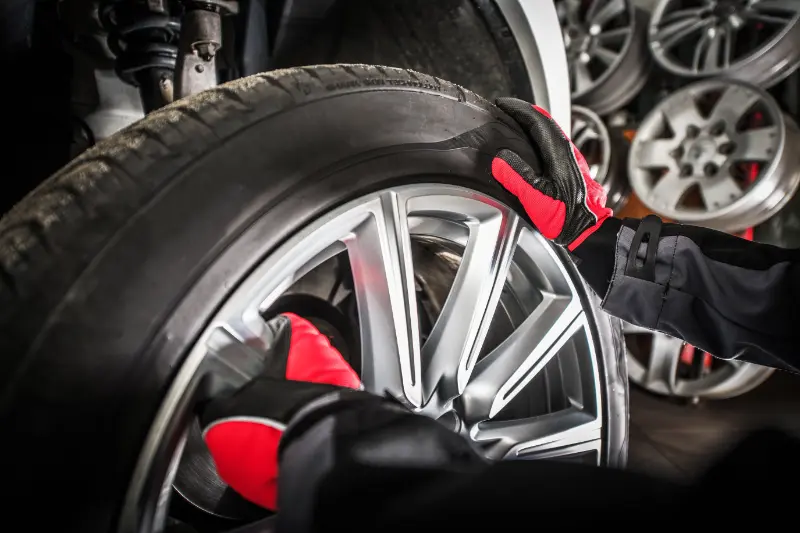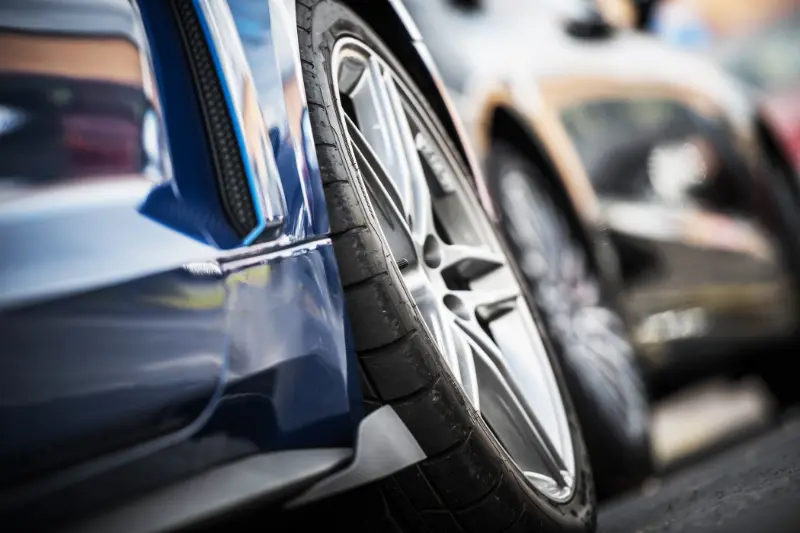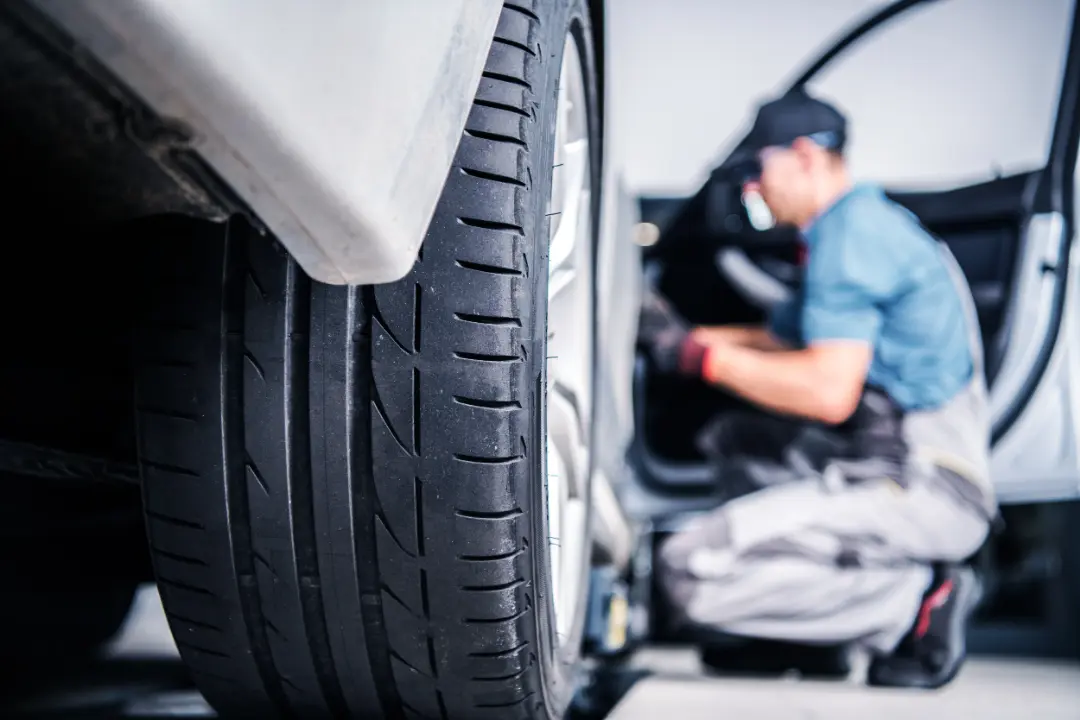When it comes to maintaining your vehicle’s performance and safety, selecting the right set of tyres is paramount.
The year 2025 brings an array of options for car owners, from summer and winter variants to all-season and high-performance tyres.This comprehensive guide aims to illuminate the critical aspects of choosing the best car tyres for your vehicle, balancing between premium offerings and budget-friendly options while considering factors like tyre size, brand reputation, and specific driving conditions.

Key Takeaways
- Choosing the correct tyre size is crucial for maintaining your vehicle’s handling, fuel economy, and safety. Incorrect tyre sizes can negatively affect suspension systems and lead to inaccurate speedometer readings.
- EU tyre labels provide vital information on fuel economy, wet grip, and external noise. These labels can help guide consumers toward selecting tyres that balance performance and sustainability.
- Seasonal tyres provide optimized performance in specific weather conditions, while all-season tyres offer versatility year-round, though they may not excel in extreme conditions.
- All Vehicle Services offers a wide selection of high-quality tyres, expert advice, and both in-store and mobile fitting services.
What Determines the Best Car Tyre for Your Vehicle?
Tyre Size and Its Impact on Performance
Tyre size directly influences a vehicle’s handling, fuel economy, and overall comfort. Each tyre is marked with a unique code that signifies its width, height, and diameter, factors that must synchronise with your vehicle’s specifications for optimum performance.
Choosing a tyre with the correct size is not just about ensuring a good fit; it’s about maintaining the integrity of your vehicle’s dynamics.
Incorrect tyre sizes can lead to inaccurate speedometer readings and could potentially harm your vehicle’s suspension system.
Deciphering Tyre Labels: Fuel Economy and Wet Braking Considerations
The EU tyre label provides essential information on fuel economy, wet grip, and external noise levels. Tyres with low rolling resistance improve fuel economy by minimising the energy lost when they roll.
Conversely, excellent wet grip ratings ensure shorter stopping distances in wet conditions, enhancing safety. Understanding these labels can guide consumers in choosing tyres that offer a balance between performance and efficiency, a crucial step for those prioritising sustainability and safety.
The Importance of Selecting the Right Tyre Brand for Durability and Quality
Not all tyres are created equal. Renowned brands like Michelin, Bridgestone, and Goodyear have made significant investments in technology and research to offer products that promise durability, enhanced safety, and performance. While premium tyres from these leading manufacturers may come with a higher price tag, they also bring peace of mind through extensive warranties and proven track records in various conditions. Mid-range and budget tyre options also exist, catering to those who seek a balance between cost and performance.
Breaking Down the Tyre Types: Summer, Winter, and All-Season Tyres
Summer Tyre Benefits: Why They Excel in Warm Weather Conditions
Summer tyres are designed to provide optimal performance in warm weather. Their tread patterns and rubber compounds are engineered to offer excellent grip and handling on both dry and wet roads.
The performance of summer tyres in high temperatures and their adaptability to wet conditions make them a preferred choice for drivers in climates where winters are mild or nonexistent. Additionally, the best summer tyres enhance fuel economy by reducing rolling resistance.
Winter Tyre Advantages: Enhanced Grip and Safety in Cold Climates
Winter tyres offer superior performance in cold, icy, and snowy conditions. Their tread depth design and special rubber compounds are crafted to remain flexible at lower temperatures, providing improved traction and safety. The tread blocks help reduce the risk of aquaplaning while improving traction.
Winter tyres are essential for drivers in regions experiencing severe winter conditions, significantly reducing the risk of accidents due to slipping on ice or snow.
Winter tyres are also tested on wet handling lap time and aquaplaning tests, which reveal their capabilities in slushy and rainy conditions.
Choosing All-Season Tyres: A Compromise or the Best of Both Worlds?
All-season tyres aim to provide a balanced performance in various weather conditions, from dry summer roads to wet or lightly snow-covered surfaces.
However, while they offer convenience and year-round use without the need for seasonal tyre changes, they might not match the specific performance capabilities of tyres designed for particular weather conditions.
While all-season tyres may not be the best performing tyres in specific extremes, they do offer commendable all round performance, especially for drivers who prefer not to worry about changing tyres seasonally. Many car enthusiasts appreciate their balance across wet tests, dry handling, and fuel consumption.
The choice between all-season and season-specific tyres depends on the driver’s regional climate and driving habits.
Best Tyre Brands of 2025: From Michelin to Goodyear
Michelin Tyres: A Blend of Performance and Longevity
Michelin has consistently been at the forefront of tyre innovation, offering a range of tyres that excel in longevity, fuel efficiency, and performance. Michelin tyres are known for their superior wet and dry grip, contributing to safer driving experiences.
Additionally, their commitment to sustainability through reduced rolling resistance and longer wear life sets them apart in the tyre industry.
Goodyear Tyres: Leading Innovation in Wet and Dry Braking
Goodyear tyres stand out for their advanced technologies in wet and dry braking, ensuring high levels of safety and performance. The brand has developed a reputation for producing durable tyres that maintain excellent traction across a variety of driving conditions.
Goodyear’s investment in research and development continually pushes the boundaries of tyre performance, solidifying its position as a top tyre manufacturer.
Pirelli and Continental: High-Performance Tyres for Sports Cars
Pirelli and Continental are synonymous with high-performance tyres, specifically catering to sports cars and high-end vehicles. These brands prioritise precision handling, exceptional grip, and optimised fuel economy, making them a preferred choice among performance enthusiasts.
These premium brands are frequently ranked at the top during handling tests on both dry performance and wet circle trials. For sports cars reaching their maximum speed, maintaining outright grip and steering feel is essential to ensure precise control and safety.
Their commitment to innovation and quality has ensured that they remain popular tyre choices for car manufacturers and drivers alike.

Choosing the Right Tyre for Your Driving Style
Finding the right rubber for your vehicle depends heavily on your driving habits, climate, and car type. Performance-focused drivers will naturally lean towards the best performance tyres, valuing quick acceleration, responsive steering feel, and excellent dry performance. However, those driving family cars may prioritise ride comfort, longer tyre life, and fuel efficiency instead.
Whether you own a new car or a daily commuter, the goal is to find tyres that align with your expectations, balancing grip, tread depth, and all round performance.
For urban environments, tyres with low rolling resistance and quieter operation can improve fuel economy and reduce cabin noise. For highway driving or spirited weekend runs, prioritising outright grip and high-speed stability makes more sense.
Decoding Performance Tyres: What Sets Them Apart?
The Role of Rolling Resistance in Enhancing Fuel Economy
Performance tyres are engineered to strike a balance between optimal grip and reduced rolling resistance.
Lower rolling resistance means that the tyre does not require as much energy to roll, thereby enhancing the vehicle’s fuel economy.
This efficiency does not come at the cost of safety; performance tyres also ensure that braking distances on both wet and dry surfaces are minimized.
Brake Performance: How Tyres Influence Stopping Distance in Wet and Dry Conditions
The ability of a tyre to maintain good grip on wet and dry roads directly affects braking performance and, consequently, the safety of the vehicle and its occupants. Performance tyres are designed with advanced tread patterns and compounds to ensure robust braking capabilities.
Whether navigating through a downpour or coming to a stop on a dry road, these tyres help reduce stopping distances significantly.
Run-Flat Tyres: Combining Convenience and Safety on the Road
Run-flat tyres represent a leap in tyre technology, offering the ability to continue driving for a certain distance even after a puncture.
This feature not only adds a layer of convenience but also significantly increases safety, eliminating the need for immediate tyre changes in potentially dangerous roadside situations.
Though typically found on new cars from high-end manufacturers, run-flat options are becoming more popular among drivers looking for both ride comfort and reliable wet braking. Their availability across an extensive range of tyre models helps consumers find tyres that suit both performance and safety expectations.
While typically more expensive, the benefits they offer make run-flat tyres an attractive option for many drivers.
Where to Buy and When to Replace: Navigating the Lifecycle of Your Tyres
Finding the Best Deals: Where to Buy Premium, Mid-Range, and Budget Car Tyres
From online retailers to brick-and-mortar stores, there are numerous options for purchasing car tyres. Prices can vary widely depending on the retailer, brand, and tyre type, so it’s beneficial to research and compare before making a decision.
Specialised tyre shops often offer knowledgeable staff and the opportunity to consult with experts on the best car tyres to buy for your specific needs and budget.
All Vehicle Services: Your Trusted Tyre Partner in Sittingbourne
For over a decade, All Vehicle Services has been the go-to destination for tyres in Sittingbourne seeking quality, reliability, and exceptional customer service. Our extensive range includes premium brands like Michelin, Continental, Goodyear, and Pirelli, as well as dependable mid-range and budget options, ensuring we cater to every driver’s needs and budget.
Whether you’re driving a compact car, a family SUV, or a commercial van, our expert team is here to help you find the perfect tyres for your vehicle.
What sets us apart is our commitment to customer satisfaction. Our knowledgeable staff offers personalised advice, helping you make informed decisions about tyre selection and vehicle maintenance.
With services ranging from tyre fitting and wheel alignment to MOT testing and comprehensive car servicing, we provide a one-stop solution for all your automotive needs. Experience the difference at All Vehicle Services today. Call us today at 01795 422040 or visit our website to book your appointment.
We Also Offer Convenient Mobile Tyre Fitting: We Come to You
Understanding the busy schedules of our customers, All Vehicle Services offers a flexible mobile tyre fitting service that brings our expertise directly to your doorstep. Whether you’re at home, at work, or stranded on the roadside, our skilled technicians will arrive equipped to replace or repair your tyres promptly and efficiently.
This service is available for both private and commercial vehicles, ensuring minimal disruption to your day.
Our mobile service doesn’t compromise on quality. We carry a wide selection of tyres from leading brands, ensuring you receive the same high standards as you would in our garage. With 24/7 availability, including weekends and holidays, we’re always ready to assist you when you need it most.
Trust All Vehicle Services for reliable, on-the-go tyre solutions that prioritise your convenience and safety.
Understanding Tyre Wear: Signs It’s Time to Replace Your Tyres
Tyres naturally wear out over time and through use. Key indicators that it’s time to replace your tyres include visible tread wear, cracks in the sidewall, and bulges or blisters on the surface. Regularly checking these signs can prevent accidents and ensure your vehicle operates safely.
Additionally, adhering to the manufacturer’s recommended tyre lifespan is crucial for maintaining performance and safety. Drivers should note that high rolling resistance can signal ageing or poorly performing tyres, leading to increased fuel consumption and reduced grip.
Replacing all the tyres at once, especially when upgrading to new tyres from trusted premium brands, helps maintain balance and overall performance.
Maintenance Tips on How to Extend the Life of Your Tyres
Proper maintenance can significantly extend the life of your tyres. Regularly checking the tyre pressure, ensuring the wheels are correctly aligned, and rotating the tyres can help maintain even wear and performance.
Avoiding overloading your vehicle and aggressive driving practices also contributes to longer tyre life.
Following these maintenance tips will not only save money in the long run but also enhance your vehicle’s safety and fuel efficiency.
Summary
Choosing the right tyres is crucial for both the safety and performance of your vehicle. Whether you’re looking for tyres for dry roads, winter conditions, or year-round versatility, understanding the different types and brands available will help you make an informed decision. By considering factors like tyre size, brand reputation, and weather suitability, you can ensure that your vehicle runs smoothly and efficiently.
For the best tyre selection and expert services, All Vehicle Services in Sittingbourne is your go-to destination.
With our range of premium, mid-range, and budget tyres, combined with knowledgeable staff and the convenience of mobile tyre fitting, we make buying and fitting tyres hassle-free. Contact us today for a seamless tyre buying experience and ensure your vehicle stays safe and roadworthy.

